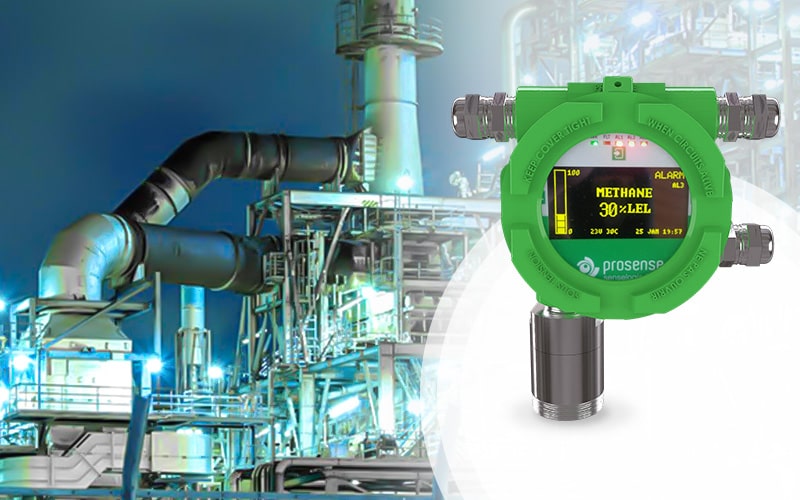
Petrochemical
High security against Hydrocarbons and Toxic gases
Petrochemical is the general name given to industrial methods used to produce organic chemical products from petroleum. Upon the widespread use of petroleum as an energy source in the 1920s, the efforts to evaluate cracking gases gave birth to the petrochemical industry. This industry focuses on the nature of fossil fuels - 80% Carbon and 12% Hydrogen on average -
With the Second World War, the petrochemical industry added strategic importance to its place in the economy. The petrochemical industry, which started with synthetic rubber and explosives, has become an indispensable point in our lives with fertilizer and plastic production. Various methods are used to obtain chemical products in this industry. The methods used can be divided into 3 groups in general.
1. Aliphatics: Methods applied for raw materials such as butadiene, butylenes, propylene, propane, acetylene, ethylene, ethane obtained by cracking petroleum products or natural gas at high temperature;
2. Aromatics: Processes applied to raw materials such as naphthalene, xylenes, toluene, benzene and other unsaturated cyclic hydrocarbons provided by the catalytic conversion of naphtha;
3. Inorganics: methods applied for raw materials such as sulfur, coal, hydrogen cyanide, ammonia.
Oil, natural gas and tar are the first links in the petrochemical production chain. Certain main chemicals are produced from these products, which are the source of raw materials. These are alkenes (ethylene, propene, and butadiene), aromatics (benzene, tilen and xylen) and methanol. These master chemicals are then converted into a series of intermediate chemicals that can be counted in the thousands. In this process, substances such as chlorine, nitrogen or oxygen are added to the raw material, which has only carbon and hydrogen in its structure. Some of the intermediate chemicals can be sold commercially, and some are used as intermediate goods.
Turkey to establish Petkim petrochemical industry has come a little late in 1965 by the state. Today 25% of all chemicals produced in Turkey are intertwined with the petrochemical industry. Production capacity in Turkey is still far behind the demand. In the world, demand and production are increasing every day with the contribution of developing countries. In 2018, the petrochemical industry size reached 700 billion dollars. The biggest producers in the world that contribute to this figure; BASF, Dow Chemical, Exxon Mobil Chemical, LyondellBasell Industries, INEOS, Saudi Basic Industries Corporation, Formosa Plastics Corporation, Formosa Plastics Corporation, Sumitomo Chemical, DuPont, and Chevron Phillips.
In recent years, there have been great changes and developments in the chemical, petrochemical and oil-based industries. While the sector has reached a production capacity of 1 million tons and a storage capacity of 50,000 m3, the sector has grown uncontrolled due to its nature, and major accidents have made it necessary to take precautions regarding safety. Petrochemical industry is a sector where very strict precautions are taken regarding security due to its strategic importance.
The explosion in the town of Flixborough, England in 1974, in which 28 people died and 36 people were injured, is one of the turning points in the chemical and petrochemical industry. Two years after Flixborough, the European Union passed the Seveso Directives after an explosion at a chemical factory in Seveso, Italy.
However, Flixborough and Seveso accidents did not completely prevent accidents in the petrochemical industry. As a result of the explosion and subsequent fire in Mexico City, USA on November 19, 1984, 550 people died, 2,000 people were injured and 10,000 people were left homeless. Two weeks later, on December 3, 1984, after a gas leak at a chemical factory in Bhopal, India, 2,500 people died and 25,000 were injured.
One of the most prominent international practices in the prevention of accidents is the Responsible Care Program, which was established in Canada in 1984 and was undertaken by the American Chemistry Council in 1988. The Responsible Care, which Petkim is also a member of, has become an international standard today.
OHSAS 18001, the Occupational Health and Safety standard, which has more stringent requirements after the Triple Responsibility, was implemented by the British Standards Institute in 1999. This standard was adopted by Turkey in 2001 as a TS 18001. Another international standard is the PSM Standard, which was put into practice by the US Work and Worker Safety in 1992 as a result of the accident that occurred at the Philips Petrochemical plant in October 1989. Although the PSM standard for petrochemical, chemical and petroleum companies is of US origin, many companies and organizations from outside the US apply this standard voluntarily. Since an accident in this sector may cause irreparable consequences, companies try to take measures beyond the standards.
Gas detection is an indispensable element for security due to the nature of the industry. Since this sector has serious risks, it is important to use gas detectors in SIL2 standards. With our PQ series, we can offer the most accurate solution for humans and the environment with reliable applications in this sector. You can reduce the risks in the petrochemical industry with the PQ series equipped with the most up-to-date technologies.
